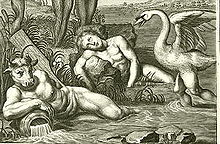Cycnus of Liguria
| Cycnus | |
|---|---|
 Cycnus changed into a swan | |
| Abode | Liguria |
| Personal information | |
| Parents | Sthenelus |
| Consort | Phaethon (lover) |
| Children | Cinyras, Cupavo |
In Greek mythology, Cycnus (Ancient Greek: Κύκνος "swan") or Cygnus was a king of Liguria, a beloved and kin of Phaethon, who lamented his death and was subsequently turned into a swan and then a constellation.[1]
Mythology
Family
Cycnus was the son of Sthenelus and the lover of Phaethon (Servius explicitly writes "amator", or lover). According to Ovid, he was a distant relative of Phaethon on his mother's side. Servius also mentions that Cycnus had a son named Cupavo.[2]
Transformation
After Phaethon died, Cycnus sat by the river Eridanos mourning his death. The gods turned him into a swan to relieve him of his sorrow. Even then he retained memories of Phaethon's death, and would avoid the sun's heat because of that.[3] Swans are known for mourning their mate for many days when they die, which suggests that Cygnus and Phaethon were lovers.[4][5][6] According to Virgil, Cycnus lamented Phaethon's death till he grew old, so his gray hair became gray feathers upon his transformation.[7] Pausanias mentions Cycnus, king of the Ligyes (Ligurians), as a renowned musician who after his death was changed into a swan by Apollo.[8] Servius also writes of Cycnus as a musician and a friend of Phaethon, and states that he was changed into a swan and later was placed among the stars by Apollo (that is, as the constellation Cygnus), who had also once blessed him with talent in singing.[2] Cycnus's talent as a musician may serve the association with the concept of the swan song suggested in Hyginus's account.[9]
Notes
- ^ William Smith, Dictionary of Greek and Roman Biography and Mythology Cycnus
- ^ a b Servius on Aeneid 10.189
- ^ Ovid, Metamorphoses 2.367-380
- ^ Wedderburn, Pete (3 September 2015). "Animals grieve just as people do". The Telegraph. Retrieved 25 July 2019.
- ^ "Lonely Irish swan 'hugs' cars after its mate was killed". IrishCentral.com. 22 October 2018. Retrieved 25 July 2019.
- ^ "The care and treatment of swans and waterfowl with an established worldwide reputation". The Swan Sanctuary. Retrieved 25 July 2019.
- ^ Virgil, Aeneid 10.189
- ^ Pausanias, 1.30.3
- ^ Hyginus, Fabulae 154
References
Ancient
- Pausanias, Pausanias Description of Greece with an English Translation by W.H.S. Jones, Litt.D., and H.A. Ormerod, M.A., in 4 Volumes. Cambridge, MA, Harvard University Press; London, William Heinemann Ltd. 1918. Online version at the Perseus Digital Library.
- Vergil, Aeneid. Theodore C. Williams. trans. Boston. Houghton Mifflin Co. 1910. Online version at the Perseus Digital Library.
- Ovid, Metamorphoses, Volume I: Books 1-8. Translated by Frank Justus Miller. Revised by G. P. Goold. Loeb Classical Library No. 42. Cambridge, Massachusetts: Harvard University Press, 1977, first published 1916. ISBN 978-0-674-99046-3. Online version at Harvard University Press.
- Hyginus, Gaius Julius, The Myths of Hyginus. Edited and translated by Mary A. Grant, Lawrence: University of Kansas Press, 1960.
- Maurus Servius Honoratus, In Vergilii carmina comentarii. Servii Grammatici qui feruntur in Vergilii carmina commentarii; recensuerunt Georgius Thilo et Hermannus Hagen. Georgius Thilo. Leipzig. B. G. Teubner. 1881. Online version at the Perseus Digital Library.
Modern
- Smith, William, Dictionary of Greek and Roman Biography and Mythology, London (1873). Online version at the Perseus Digital Library.
External links
- CYCNUS from The Theoi Project
- v
- t
- e
| Avian |
|
|---|---|
| Non-avian |
|



- Aconteus
- Aglaurus
- Alcmene
- Anaxarete
- Ariadne
- Arsinoë
- Aspalis
- Battus
- Britomartis
- Calydon
- Cercopes
- Cragaleus
- Daphnis
- Iodame
- Laelaps
- Lethaea
- Lyco and Orphe
- Olenus
- Pallas
- Pandareus
- Phineus
- Polydectes
- Proetus
- Propoetides
- Pyrrhus
- Teumessian fox
- Wolf
- Achelous
- Acheron
- Acis
- Aea
- Alope
- Alpheus
- Arethusa (Boeotia)
- Arethusa (Elis)
- Arethusa (Ithaca)
- Asteria
- Atlas
- Aura
- Byblis
- Calliste
- Castalia
- Chione
- Cleite
- Cyane
- Dirce
- Haemus
- Lichas
- Lilaeus
- Manto
- Marsyas
- Menippe and Metioche
- Niobe
- Perimele
- Pirene
- Pyramus and Thisbe
- Rhodope
- Rhodopis
- Sangas
- Selemnus
- Sybaris
- Adonis
- Agdistis
- Ajax
- Amaracus
- Ambrosia
- Ampelus
- Anethus
- Attis
- Baucis and Philemon
- Calamus
- Carpus
- Carya
- Cissus
- Clytie
- Crocus
- Cyparissus
- Daphne
- Diopatra
- Dryope
- Elaea
- Elate
- Eteocleides
- Heliades
- Hesperides
- Aegle
- Erytheia
- Hyacinthus
- Leuce
- Leucothoe
- Libanus
- Lotis
- Lycurgus
- Mecon
- Melus
- Messapians
- Milk
- Minthe
- Myrice
- Myrina
- Myrsine
- Narcissus
- Oechalides
- Philyra
- Phyllis
- Picolous
- Pitys
- Platanus
- Psalacantha
- Saliva
- Side
- Smilax
- Smyrna
- Spear
- Syceus
- Syrinx
- Cumaean Sibyl
- Echo
- Hyades
- Hylas
- Milk of Hera
- Pleiades











